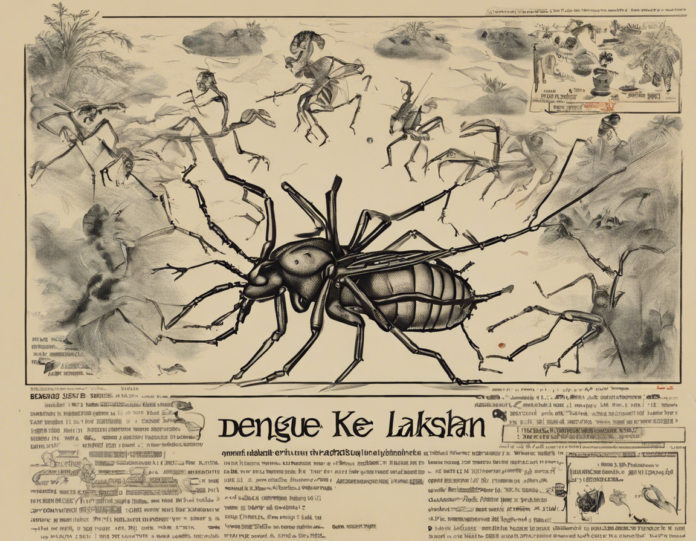Introduction:
Dengue fever is a mosquito-borne viral infection transmitted by the Aedes aegypti mosquito. It is prevalent in tropical and subtropical regions around the world, with about half of the global population at risk. The onset of dengue symptoms can be sudden and severe, making early detection crucial for effective treatment. In this article, we will discuss the signs and symptoms of dengue fever to help you identify and seek prompt medical attention if needed.
Signs and Symptoms of Dengue Fever:
Dengue fever manifests through a variety of symptoms that can range from mild to severe. It is important to note that not everyone infected with the dengue virus will exhibit symptoms, but for those who do, the following are the most common signs to watch out for:
1. Fever:
One of the hallmark symptoms of dengue fever is a sudden onset of high fever, often reaching up to 104°F (40°C). The fever typically lasts for 2 to 7 days.
2. Severe Headache:
Patients with dengue fever often experience intense headaches, which can be debilitating and persistent.
3. Muscle and Joint Pain:
Dengue fever is also known to cause severe muscle and joint pain, often described as aching or throbbing sensations.
4. Fatigue and Weakness:
Patients may feel extreme fatigue and weakness, which can persist for days or even weeks after the fever subsides.
5. Nausea and Vomiting:
Dengue fever can cause nausea, vomiting, and abdominal pain, leading to dehydration in some cases.
6. Skin Rash:
Some individuals with dengue fever develop a characteristic skin rash that appears 2 to 5 days after the onset of fever. The rash is often described as maculopapular and may affect the trunk and limbs.
7. Petechiae and Bruising:
In more severe cases of dengue fever, patients may experience petechiae (small, red or purple spots on the skin) or easy bruising due to decreased platelet count.
8. Mild Bleeding:
Dengue fever can sometimes lead to mild bleeding manifestations, such as nosebleeds, bleeding gums, or easy bruising.
9. Difficulty Breathing:
In severe cases of dengue fever, fluid accumulation in the lungs can cause difficulty breathing, which requires immediate medical attention.
10. Dengue Hemorrhagic Fever (DHF) and Dengue Shock Syndrome (DSS):
In rare cases, dengue fever can progress to more severe forms known as Dengue Hemorrhagic Fever (DHF) and Dengue Shock Syndrome (DSS). Symptoms of DHF and DSS include severe abdominal pain, persistent vomiting, bleeding from the nose or gums, and signs of shock such as cold clammy skin, rapid pulse, and decreased urine output. These are medical emergencies that require urgent treatment in a hospital setting.
Diagnosis and Treatment:
If you experience any of the aforementioned symptoms and suspect dengue fever, it is crucial to consult a healthcare provider for an accurate diagnosis. Doctors may recommend blood tests to detect the presence of the dengue virus or antibodies produced in response to the infection. Treatment for dengue fever is primarily supportive and focuses on relieving symptoms such as fever, pain, and dehydration. In severe cases, hospitalized care may be necessary to monitor vital signs, manage complications, and provide intravenous fluids.
Prevention of Dengue Fever:
Prevention is key when it comes to dengue fever. Here are some preventive measures you can take to reduce the risk of mosquito bites and dengue infection:
- Use mosquito repellent: Apply mosquito repellent containing DEET, picaridin, or oil of lemon eucalyptus to exposed skin.
- Wear protective clothing: Cover your skin with long-sleeved shirts, pants, socks, and closed-toe shoes to prevent mosquito bites.
- Eliminate breeding sites: Remove standing water around your home where mosquitoes breed, such as in flower pots, buckets, and birdbaths.
- Use mosquito nets: Sleep under mosquito nets, especially during peak mosquito activity times.
- Stay indoors: Avoid outdoor activities during dawn and dusk when mosquitoes are most active.
By following these preventive measures, you can significantly reduce the risk of contracting dengue fever and other mosquito-borne illnesses.
Frequently Asked Questions (FAQs):
1. What is the incubation period for dengue fever?
- The incubation period for dengue fever is typically 4 to 10 days after being bitten by an infected mosquito.
2. Can dengue fever be transmitted from person to person?
- No, dengue fever is not directly transmitted from person to person. It is spread through the bite of an infected mosquito.
3. Is there a vaccine available for dengue fever?
- Yes, there is a dengue vaccine called Dengvaxia, but its use is limited to individuals aged 9 to 45 years living in high-risk areas.
4. Can dengue fever recur after recovery?
- Yes, it is possible to be infected with dengue fever multiple times, as there are four different serotypes of the virus. Subsequent infections with different serotypes can increase the risk of severe dengue.
5. Are children more susceptible to dengue fever?
- Children are at a higher risk of severe dengue due to their immature immune systems. It is important to take extra precautions to protect children from mosquito bites.
6. Is there a specific treatment for dengue fever?
- There is no specific antiviral treatment for dengue fever. Supportive care to manage symptoms and complications is the mainstay of treatment.
7. Can dengue fever be fatal?
- While most cases of dengue fever resolve on their own with appropriate care, severe dengue can be life-threatening if not managed promptly.
8. Are there any long-term complications of dengue fever?
- Some individuals may experience lingering symptoms such as fatigue, weakness, and joint pain for weeks or months after recovering from dengue fever.
9. Is it safe to travel to dengue-endemic areas?
- Travelers to dengue-endemic regions should take precautions to prevent mosquito bites, such as using repellents, wearing protective clothing, and staying in air-conditioned or screened accommodations.
10. How can I differentiate between dengue fever and other mosquito-borne illnesses?
- Dengue fever symptoms can overlap with other diseases like chikungunya and Zika virus infection. A healthcare provider can conduct tests to confirm the specific viral infection.
In conclusion, recognizing the signs and symptoms of dengue fever is essential for timely diagnosis and treatment. By staying informed about the disease and taking preventive measures to reduce mosquito exposure, you can protect yourself and your family from dengue fever and its complications. If you suspect you have dengue fever, seek medical attention promptly to receive appropriate care and management.

